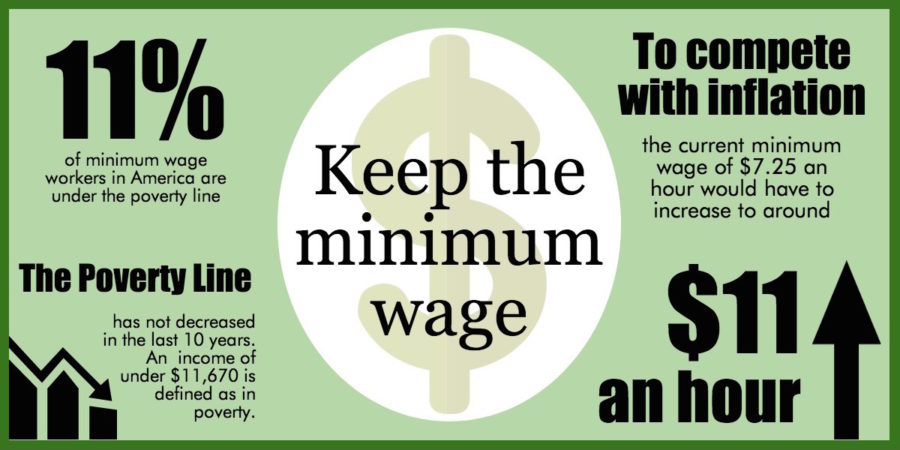Mcgarvey: Do not raise minimum wage
Richard Martinez/Iowa State Daily
An increase in the minimum wage would lead to the same result as the last forced wage increase, higher inflation. If the minimum wage continued to increase at the same amount as inflation, a worker would make close to $11 an hour.
November 20, 2014
An increase in the minimum wage would lead to the same result as the last forced wage increase, higher inflation.
If the minimum wage continued to increase at the same amount as inflation, a worker would make close to $11 an hour. That worker would also be the sole income and be able to support their family without having to apply for government aid.
As a college student, I would love to be in favor of an increase in wages. But as someone who wants to see prosperity and stability, I don’t see how paying more money for the same work to be done will help the economy.
After the last minimum wage increase, there was a predicted spike in the unemployment of unskilled young workers. David Henderson, an economist working with the NCPA insisted that in 2006, increasing workers’ wages would not lead to more jobs, but less jobs leading to the same levels of productivity.
One of the argument’s proponents of the minimum wage increase is that the more money workers receive, the more money gets put back into the economy. The national poverty line has not decreased in the last 10 years, says Henderson. Raising the minimum wage did not work the last time, and it would not work this time.
By paying employees more money, we’re simply putting other employees out of a job. If smaller stores are forced to pay their employees more money, the stores must continue to grow to match the rate of the wage increase. If the store does not improve sales, they only have a few options: cut back on employees and make less employees do more or raise the prices of their currents goods and services.
The first option might better please the public. Yes, the unemployment rate would skyrocket from its current 5.8 percent, but the lucky workers who managed to keep their jobs would be able to afford more items.
The second option of raising prices to afford the increase wages is the more likely solution. If we use a typical grocery store as an example, there is a constant competition in prices. If Store A cuts its employees, their prices would not have to rise. Store B won’t cut employees; instead, they raise their prices. If store B wants to continue competition with store A, the profit margin would dramatically decrease and possibly put store B out of business. This would leave many people unemployed, looking for a job in even worse conditions than they already are.
Companies that employ a large amount of minimum wage workers also employ workers with wages much higher than the $7.25 rate. If the minimum wage rate increase, does the worker who makes more money deserve a raise as well? Suddenly the people with the most responsibility will be making the same as the entry level workers. By increasing the minimum wage, companies would be forced to raise all employee salaries, not just minimum wage workers.
If we continue to look at economist Henderson’s calculations, only 11.3 percent of minimum wage workers are under the poverty line. By raising the minimum wage, we’d be paying more money to the households with two incomes or more that live two or three times above the poverty line.
Academics like David Neumark and William Wascher have found that there isn’t a real correlation between poverty and the minimum wage. Promising a wage increase, like our president has done, will not lead to a reduction of impoverished people. But it can lead to reduction in school attendance and an increase in teen crimes.
Instead of raising the minimum wage, an increase in school funding should be the focus of politicians. By placing an emphasis on teaching and learning, students may focus on gaining experience to become more specialized in the workplace.
Raising the minimum wage seems detrimental to the growth of the United States. It may give people a reason not to go to school but to continue working at jobs that pay minimum wage. Yes, big companies can afford to pay their employees more but at what cost? The focus of our country should be toward reforming the education systems and helping the less fortunate achieve their goals through training, not a pay raise.
Minimum wage is not meant to be a sole income for an adult. The wage of $7.25 is meant for a younger worker just beginning in the workplace or a secondary income for a household. If an adult is forced to live on minimum wage, a two or three dollar raise will not help their financial status by any means.
“Based on 20 years of research, I doubt there is ever a good time to raise the minimum wage,” Neumark said.
Earning more money is something everyone wants to do. I would rather see people work to obtain financial and economic stability by gaining experience, rather than rely on the government to force companies to give out pay raises every few years.







